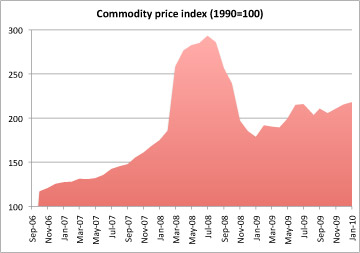EU biofuels target will starve the poor, says anti-poverty group
mongabay.com | February 16, 2010
The European Union's biofuel targets could starve up to 100 million people, warns a report from an anti-poverty charity.
ActionAid estimates the E.U.'s plan to source 10 percent of transport fuels from biofuels would increase competition for agricultural lands, spurring a sharp rise in food prices. Dearer food would disproportionally affect the world's poorest people.
"Biofuels are conservatively estimated to have been responsible for at least 30% of the global food price spike in 2008," states Meals per gallon. "It was estimated in 2008 that the food crisis had already pushed a further 100 million people into poverty and driven about 30 million more people into hunger."
"If all global biofuel targets are met, it is predicted that food prices could rise by up to an additional 76% by 2020. An estimated 600 million extra people may be hungry because of industrial biofuels by this date."
Beyond food scarcity concerns, ActionAid says biofuel targets will increase conflict over land and exacerbate environmental problems.
"The scale of the current land grab is astonishing," the report states. In just five African countries, 1.1 million hectares have been given over to industrial biofuels – an area the size of Belgium... EU companies have already acquired or requested at least five million hectares of land for industrial biofuels in developing countries – an area greater than the size of Denmark."
The report argues that cropland expansion (17.5 million hectares will be needed in developing countries to meet the E.U.'s 10 percent target) will come at the expense of tropical forests and peatlands, worsening climate change.
"[Industrial biofuels] are the least cost-effective way of saving GHG emissions compared to other uses of the feedstock (the crops that go to make biofuel)," states the report. "Industrial biofuels are therefore a red herring in the fight against climate change, and will compound hunger and poverty for the poor in the future."
Meals per gallon comes as biofuel industry lobbyists are making progress in their efforts to retain targets and relax environmental standards. Earlier this month a leaked document showed the E.U. is considering language that would classify industrial plantations as natural forests, allowing large-scale conversion of rainforests for biofuel production. Biofuel supporters claim conventional biofuels would boost economic activity in poor rural areas, but critics say the biggest beneficiaries of industrial plantations are corporations and expansion will deprive some already-disadvantaged populations of traditional access to land. Due to social and environmental concerns, some biofuels experts are now pushing biofuel feedstocks that will not compete with food crops, including woody grasses in temperate regions, oil palm and other crops on abandoned and degraded agricultural lands in the tropics, and freshwater algae.











No comments:
Post a Comment